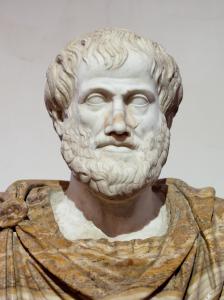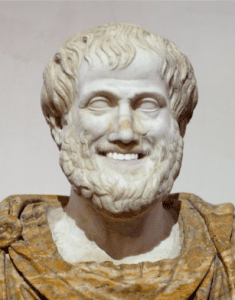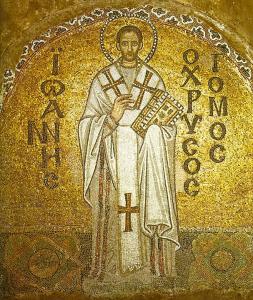Yesterday on Twitter was an incredible shit show for reasons I’m not going into here (though I will recommend Chris Damian’s excellent piece on the subject), and I had a minor emotional breakdown. So, in the name of continuing to avoid the apology I’m pretty sure I owe a priest, I’m now going to be even more critical of an actual bishop.

Bishop Robert Barron is an auxiliary in the Archdiocese of Los Angeles. He’s drawn notice via Word on Fire, a Catholic media ministry, as an evangelist and teacher. He’s also seen a couple of minor controversies; for example, a few years ago he pointed to Dr. Jordan Peterson as a good example of someone who reaches modern audiences pretty effectively, which some people took issue with.1 Today, he published a brief essay titled “We’re All Becoming Platonists Now—And That’s Not Good.” I read it, and, as an alternative to literally pulling off my own face, I will be going through it here now. Naturally I encourage my readers to consult the original, to judge whether my reading is fair.
Let’s begin.
Not a Great Start …
One of the most fundamental divides in the history of philosophy is that between a more Platonic approach and a more Aristotelian approach. Plato, of course, saw the universal or formal level of being as more real, more noble, whereas Aristotle, while acknowledging the existence and importance of the abstract, favored the concrete and particular. … This archetypal demarcation had (and has) implications for how we think about religion, science, society, ethics, and politics.
I … guess? Like, you can say “There are two kinds of [Thing]” about almost any category, and sort it into two more-or-less meaningful subcategories. But that doesn’t necessarily tell you very much, precisely because you can say it about anything. More than that, you can determine the categories pretty much however you want. You could equally well find it intensely significant that, where Plato implicitly stressed the importance of conversation and multiple views by framing his work in dialogue form, Aristotle downplayed this by writing treatises. It’s an incredibly childish way to approach literally thousands of years of thought.

It’s also worth pointing out that we’re skating over every other thing about Plato and Aristotle in this piece. Plato’s importance to St. Augustine, for example, a theologian whom several people regard as important, goes unmentioned. The fact that there’s anything else to know about these two giants of Western thought goes unmentioned.
Now, it’s open to Bishop Barron or his sympathizers to say that this is entry-level stuff, so to speak, meant for the ordinary layman and not the scholar. Fine; but in that case, it’s especially irresponsible to not only think sloppily yourself, but to be the cause of sloppiness in others.
Are You Kidding Me?
However, in the political arena, the option for a Platonic rather than an Aristotelian framework has more dangerous implications, and no one saw this more clearly than the twentieth-century theoretician Karl Popper. In his principal work, The Open Society and Its Enemies, Popper identified Plato as the father of modern totalitarianism, for Platonic political thought, he argued, subordinates the individual to a grandly abstract construal of justice.
Ah yes, because Catholicism is famously averse to grand, abstract ethical and political theories.
I’m told Popper’s reading of Plato is actually much snorted at, but I haven’t read Popper, so I can’t speak to that. What I can say is that this argument, as it’s presented, seems more like an argument against having principles than an argument for … not liking political correctness, I guess? We’ll be circling back to this.
No. What? No.
Though he reverenced Plato, Aristotle departed from this conception of the good society and took as his point of departure the aspiration and freedom of the individual.

“I’m proud to be an American.” —Aristotle
No he didn’t. Like, this is just wrong. Aristotle considered the polis, not the individual, to be the highest earthly good. His statement that “Man is a political animal” was, among other things, a statement that civic society and the common good are more important and more human than the isolated individual.
Popper contended that the Platonic streak runs perilously through Western history, but manifested itself with particular destructiveness in the totalitarianisms of the twentieth century, which had their roots in Hegel and Marx. These highly influential Germans were … basically Platonic in their tendency to subordinate the individual to the abstractions of “history” or “progress” or “the revolution,” and their practical political disciples in the twentieth century presided, predictably, over the piling up of corpses.
As I said, I haven’t read him, but if this is an accurate summation of Popper’s thought, then he deserves every snort he gets. To be clear, I hate German Idealists like I hate nuts in brownies, but to blame any of them directly on Plato is a piece of undergrad ridiculousness. It’s especially preposterous to single him out as responsible for historicism,2 which has been a favorite pastime of plenty of Aristotelians and Thomists: Dante, an ardent student of Aristotle, springs to mind.
As for political parties presiding over piles of corpses—well, not to be a woke leftist who keeps harping on St. Augustine, but if you can find me a political party that didn’t preside over a lot of corpses in the twentieth century, guess what, you’re wrong and they absolutely did. Latin America, the Middle East, Africa, and Southeast Asia have, as the kids say, entered the chat. And that’s without getting into the Native American burial grounds that some North American countries are literally built on, or the trans-Atlantic slave trade. (Unless maybe those were somehow Plato’s fault too because he gave us the myth of Atlantis? Trans-Atlantic? I dunno, there’s something there.)

J. M. W. Turner’s The Slave Ship, shamefully carrying
kidnapped humans and Platonist thought to the Caribbean
What? That’s Not Even—
Why this little tour of the history of Plato’s influence on political thinking? I feel obligated to rehearse it because, in many senses, we are all becoming Platonists now—and this should worry us. Under pressure from the “woke,” politically-correct culture, almost all of us automatically think in terms of generic categories and not in terms of individuals. When considering, for example, an appointment or an election or the constitution of a board of directors, we hardly ever ask the question, “Well, who is the best-qualified person?” Rather, we wonder whether a candidate is African American, or Hispanic, or lesbian, or transgendered, or a woman, etc. … In so doing, we are trying, in the Platonic manner, to satisfy an abstract norm of justice by subordinating the particular qualities of individuals to collective categories.
This is … not how Platonism or wokeness work. This is so historically illiterate I am having trouble articulating the ways it’s wrong in.
“Having categories” does not make you a Platonist in any meaningful sense of the word, and it’s either bizarrely dishonest or hilariously stupid to claim that it does. Plato had no interest (that we know of) in intersectionality, and identity politics are not based on Platonic categories at all—many if not most people who write theory about identity politics would reject Platonic metaphysics. It’s true that the concept of oppression and its relationship to categories like race and gender is, uh, framed in terms of categories, but this has no relationship to Plato’s politics or to the theory of the Forms. Categories are just how thought works.
Brief Detour on the Dreaded Idpol
More than that, identity politics and intersectionality are rooted in exactly the discussions of individual experience that Bishop Barron wrongly claims they erase. Put it like this: who is more likely to listen to and promote the personal testimony of, say, a Black womanist like Audre Lorde—Bishop Barron, or a “woke” politician like Alexandria Ocasio-Cortez?3 Who has in fact said we should listen to these people’s experiences, and who has pointedly ignored or mischaracterized them?
This also includes some pretty entry-level mischaracterizations of the idea that representation is important. Nobody is saying unqualified people should be preferred to qualified ones. The point of policies like affirmative action (whether it’s a good implementation of the point or not) is that subtle racist prejudices make us disproportionately likely to miss or ignore the talents and qualifications of minorities, and so we need to make a point of correcting for that bias. You know, kind of like what Aristotle says in The Nicomachean Ethics, that we need to be aware of our character problems and correct for them in order to achieve interior virtue.

Many thanks to @fellasofist for this image.
Also, the word is transgender, not transgendered. This isn’t even a politics thing—it’s a parts-of-speech thing. Transgender is an adjective, not a verb. It doesn’t take a participial ending. But let’s get back to the text.
Are You Kidding Me Right Now?
An upshot of this political and cultural Platonism is that we are tending to reverence equity of outcome over equality of opportunity. The former is a function of compelling conformity to pre-determined abstractions, while the latter, congruent with a much more Aristotelian mindset, is a determination to level the playing field as much as possible so as to give each individual a chance to achieve his or her goals. When the Rev. Martin Luther King Jr. expressed his dream that his “little children will one day live in a nation where they will not be judged by the color of their skin, but by the content of their character,” he was extolling the value of equality of opportunity, not equity of outcome.
Your Excellency, just, what!? Have you read anything King wrote besides “Letter From Birmingham City Jail” and some quotes from “I Have a Dream”? The man was a socialist! That’s why the FBI was monitoring him, they thought he was in league with the Soviets! He very much wanted equity of outcomes for people!
And more importantly, equity of outcomes isn’t a bad thing! You can argue, if you like, that the means which would ensure equality of outcomes are somehow problematic; but saying that King wasn’t interested in or didn’t want equity of outcome, or that equity of outcome is undesirable, is complete nonsense. If you don’t believe me, read the Church Fathers—see what St. John Chrysostom thinks of your owning more than one coat, let alone the choice words he has for people who are actually wealthy thanks to their “equality of opportunity.”

“We need to be very careful to protect the property of the wealthy.” —The Desert Fathers, probably
It’s just as well to point out here that a person who really does believe in equality of opportunity rather than equity of outcome should be entirely in favor of things like massive wealth and property redistribution, universal healthcare, and free education. What a person does with those resources is up to them, but if you don’t have access to at least a basic income, healthcare, and education, then in what way are your opportunities equal to people who do have those things? If you truly want a meritocracy, then everybody should certainly start at the same level, or you can’t reliably gauge their merits.
“Everyone Disliked That.”
Read a book such as Robin DiAngelo’s White Fragility in order to see the “woke” program laid out with admirable clarity.
Or don’t, because every “woke” leftist hates that book with a burning passion. This is one I’ve actively not read on the advice of friends, but the general consensus among those who have seems to be that it indulges in exactly the white-guilt-centric foolishness that Bishop Barron describes—so, points for that, I guess—and the Left doesn’t want anything to do with that, because “white people feeling guilty” is, at best, profoundly unimportant in the political sphere. Individual responsibility’s great, but it’s not a complete solution; recognizing the advantages you may have in society is important not so you can feel bad about them, but so that you can use those advantages for the good of everyone and not just yourself. (Gosh, where have I heard that sentiment before?)
Now, it is true that we need to be able to talk about historical and systemic injustices. And that does tend to result in a lot of hurt feelings among white people, because it was overwhelmingly our ancestors who killed, enslaved, and oppressed people and stole their stuff, and we still live with the consequences of that, like … the existence of several mostly-European countries in the Americas.
But the very reason the “systemic” part of systemic injustice is important is, what we’re talking about are not character flaws people need to feel ashamed of. They are problems with social institutions that require reform. No one now living is responsible for, say, doing a Trail of Tears so that white Americans could profit off the Georgia Gold Rush—what’s an issue is refusing now to deal with the injustices and inequalities that that history has left behind. It’s kind of like the transition from aristocracy to democracy; the idea was not that nobles should feel bad about being powerful, the idea was that every member of society should be able to participate in governing society, because we all have human dignity.4

White Snivelege
All white people, she argues, simply by virtue of being white, are bearers of a privilege that they must acknowledge and are, without exception, racist. All black and brown people, again just by virtue of their ethnic heritage, belong to an oppressed class and must consider their white colleagues oppressive.
This might be DiAngelo’s argument for all I know (though based on His Excellency’s version of what Platonism is, I’m skeptical), but again, this is why nobody on the Left likes DiAngelo, because this argument is indeed dumb and bad.
I don’t have time to do justice to Critical Race Theory, and I’m not an expert anyway. So let’s just take an example phrase that raises a lot of hackles: white privilege. The idea of the phrase is not “All white people are privileged” in the sense of being (a) comfortably well-off or (b) better off than all Black people, or Asian people, or whatever. The idea is that white people, because we’re thought of as “the norm” in our culture, aren’t afflicted with the dis-advantages that are imposed on others; a white person’s life may well be very hard, but their whiteness isn’t making it worse. By contrast, the way our society treats racial or ethnic minorities very much does make their problems worse. And individual success stories don’t disprove that, for much the same reason that the illustrious histories of women like Eleanor of Aquitaine or St. Joan of Arc don’t in any way prove that the Middle Ages were free of misogyny.
AAAAAAAGGHHH
Appeals, such as Martin Luther King’s, to a color-blind society …
NNNNNNNOOOOOOOOOOOOOOOOOOOOOOOOOOOOOOOOOOOOOOOOOOOOOOOO

Footnotes
1Personally I thought these criticisms were a little unfair. Pointing out that somebody’s an effective writer and speakers doesn’t mean you think their ideas are good.
2Roughly speaking, historicism is the idea that history unfolds according to certain specifiable laws, usually including some kind of metaphysical “goal.” Hegel and Marx can both pretty reasonably be called historicists; interestingly, St. Augustine was not, and this is kind of the point of The City of God.
3Also, I know the answer is “No,” but can we please retire scare quotes, just, forever? Or at least take them away from cultural commentators?
4This isn’t to say that every leftist is equally well-informed and articulate, nor that we’re all free of human resentments. Nineteen-year-olds on TikTok are as likely as anyone else to be tempestuous dipshits who have read one book and think it explains everything from the Iraq War to why their chem teacher gave them a bad grade. But every political movement has nineteen-year-old dipshits on its fringes; check out the “Deus vult” sections of Twitter sometime, if you feel like seeing the ones on the right-hand side of the political spectrum.












